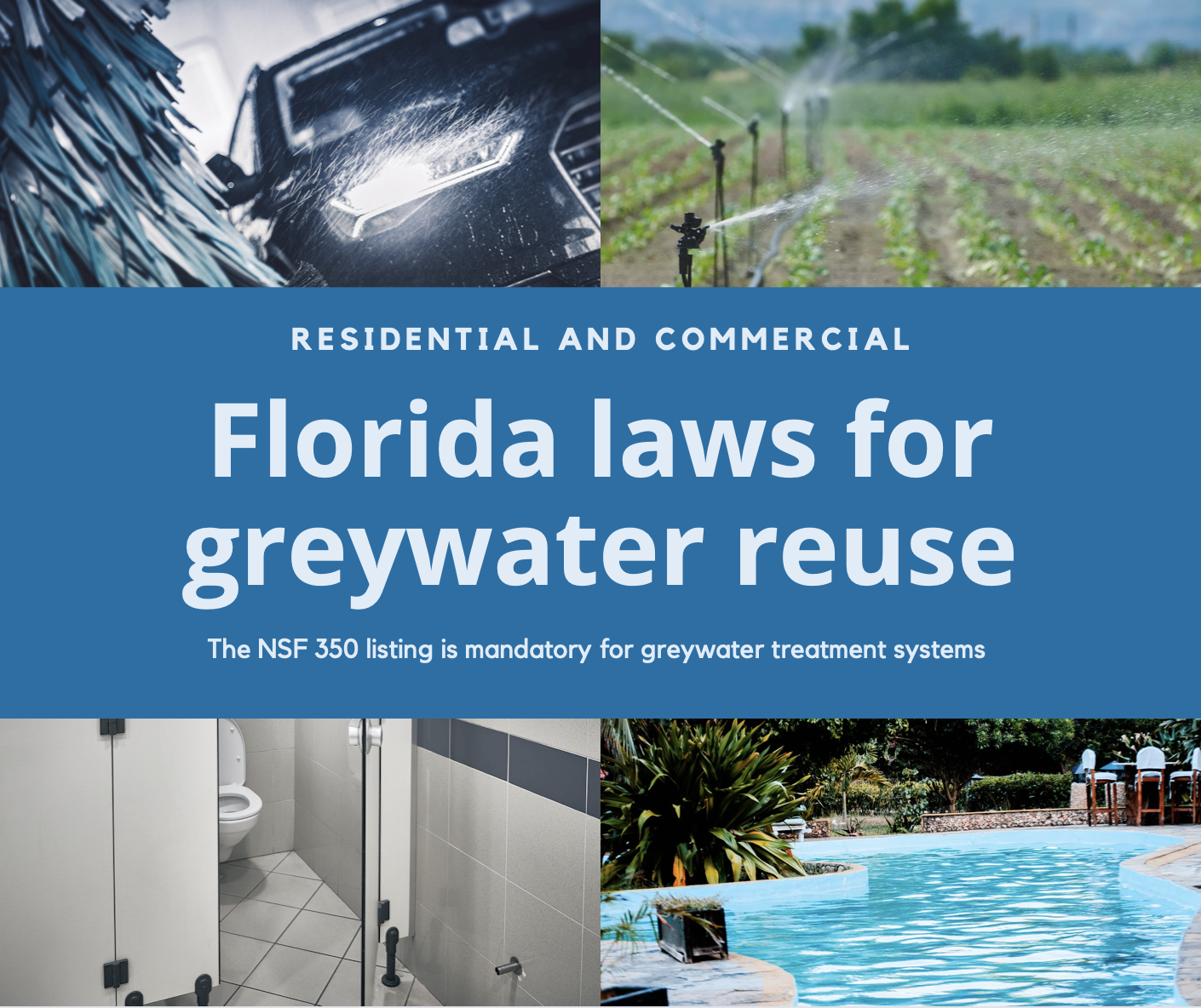What are the laws for Greywater Reuse in Florida?
In Florida, applications of onsite non-potable water include toilet and urinal flushing, car washing, and irrigation, among others. The source of onsite collected water is specified as rainwater and greywater.
- Approved reuse of greywater includes toilet and urinal flushing
- Approved reuse of rainwater includes vehicle washing, landscape irrigation, filling ornamental fountains and swimming pools, and, in certain jurisdictions, urinal and toilet flushing (Florida Plumbing Code 2017).
Onsite greywater recycling systems that treat greywater must adhere to the NSF/ANSI Standard 350 in Florida. This means that the recycling system must be free from all detectable fecal elements, sodium, viruses, or chlorine at the time of use.
When a manufacturer completes the NSF 250C review, their product will have shown satisfactory treatment for biochemical oxygen demand (BOD5), turbidity (NTU), bacteria (e.coli), and total suspended solids (TSS), among other test criteria.
The NSF certification is divided into two categories:
- Residential (R): This includes single-family residential dwellings
- Commercial (C): This includes multifamily residential units and commercial facilities. This certification is stricter than the (R) certification, for instance, regarding the level of e.coli bacteria.
The NSF 350 listing is mandatory for greywater treatment systems in numerous municipalities and states, including Florida. In the absence of it, developers and engineers may have to prove the efficacy of their treatment system via a third-party review and additional testing while acquiring a permit, provided that the system is even considered.
How is Greywater Quality Determined for Reuse?
State and local regulations determine the acceptable quality of greywater reuse for onsite applications. This has resulted in different product criteria throughout the country. The NSF/ASNI standards set forth a detailed method of evaluation that is recognized nationally.
Additional Greywater and Rainwater Reuse ApplicationsRequirements in Florida
Greywater
Greywater used for flushing urinals and toilets must be completely disinfected, filtered, and dyed with a food-grade vegetable dye. Disinfection must occur using the appropriate medium, such as ozone, iodine, or chlorine. If the water is disinfected using chlorine, it must have less than 4 mg of chloramines per liter. If ozone is used, the treated greywater must have “elevated levels” of the substance before it can be used.
Rainwater
Rainwater collected must be disinfected and filtered to ensure no harmful elements per 100 ml during the point of use. Rainwater is categorized as water derived from natural precipitation only from above-ground roofing surfaces.
According to the Florida Plumbing Code, 2017, these roofs must be made from materials compatible with the rainwater quality and collection surface for the desired use. Water collection from pedestrian surfaces and vehicular parking is forbidden except if the water is exclusively used for landscape irrigation.
Why should you Reuse Greywater?
Reusing greywater has many benefits, whether you live in Florida or any other state. These include:
- Reduced pressure on freshwater extraction from aquifers and rivers
- Lower energy use and chemical pollution during treatment
- Replenishment of groundwater and nitrification of the topsoil
How Much Greywater is generated every day?
In residential settings, approximately 33 gallons of greywater is produced every day per person, which may total around 40% to 70% of indoor water demand in an apartment, condo, or single-family unit. Around 75% of greywater is generated from baths and showers, 15% from washing clothes, and 10% from sinks.
Why invest inAqualoopGreywater Recycling System?
Aqualoop is the only NSF 350 tested and certified greywater recycling solution for both commercial and residential settings. It features a moving bed-membrane bioreactor or MB-MBR technology and equipment to treat onsite water for use in non-potable fixtures. The Aqualoop system also utilizes small fiberglass basins for its twin tank arrangement of bioreactor and can process greywater from any source. It removes around 99.9999% of bacteria, viruses, and other harmful pathogens, leaving you with high-grade water quality.
Its versatile nature allows it to scale to large commercial projects, yet it’s compact enough to be stored in your yard or basement. Moreover, it can be easily installed and maintained in various settings depending on the onsite needs with below and above-ground options.
The Bottom Line
Aqualoop Greywater recycling can help you reduce household, municipal, or well water consumption by more than 40%. It is the only system tested and certified by NSF International to the NSF 350C standard for residential and commercial applications that will provide you with grade-quality water for reuse.
For more information, visit our technical library, which will help you understand the system and its installation procedure more effectively.


